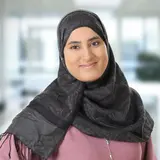Dermal Oncoimmunology Lab
- HI-TRON Mainz
- Immunology, Infection and Cancer
- Junior Research Group

Dr. Hafsa Munir
While huge leaps have been made to improve the detection, prevention, and treatment of melanoma, the incidence has increased over the past 10 years. Despite the success of immune checkpoint inhibitors, 40-70% of melanoma patients develop resistance. Cancer-associated fibroblasts induce resistance to cancer therapy and are an attractive target therapeutic target. Our lab aims to identify mechanisms of modifying cancer-associated fibroblast states to support anti-tumour immunity.

Our Research
Cancers are a highly heterogenous group of diseases. This diversity is not restricted to the malignant cells, but rather extends to the surrounding microenvironment (ME; containing fibroblasts, endothelial cells and immune cells). Recent work has shown that the state of the tumour ME plays a significant role on the anti-tumour immune response and sensitivity to immune-checkpoint inhibitors.
While autoimmune disease and cancer are opposing conditions, both are indisputably interconnected. Indeed, both are chronic inflammatory conditions in which the ME regulates disease progression through effects exerted on immune cells. Additionally, the advent of therapeutic agents targeting immune checkpoints and that autoimmunity in cancer is a positive prognostic marker highlight how inducing an autoimmune-like state within tumours could be pivotal for developing novel ways to treat cancer.
Cancer-associated fibroblasts (CAFs) provide an attractive target for driving an autoimmune-like state in tumours as these cells are critical regulators of the immune response. In the Dermal Oncoimmunology lab, we place fibroblasts at the centre of immune-regulatory networks in the skin during autoimmunity and cancer. We strive to elucidate and compare the phenotype and function of subsets of skin CAFs with those from autoimmune skin lesions. In turn, we will manipulate the CAFs to mimic aspects of fibroblasts from autoimmune skin lesions to favour a robust anti-tumour immune response.
Our lab will combine multiplexed flow cytometry, confocal microscopy with single-cell sequencing and spatial transcriptomics to characterise the phenotype and function of fibroblasts and infiltrating immune cells in the skin of patients with cancer or autoimmune skin lesions. We will also use advanced imaging tools to assess tissue topography and location of fibroblast subsets in these conditions.
We will develop and utilise microfluidic platforms incorporating complex 3D multicellular matrices, organotypic cultures and novel in vitro approaches to dissect the fibroblast-immune interactions. We will use genetic manipulation studies within these systems alongside transgenic mouse models to manipulate CAFs towards an autoimmune-like state and assess how this influences tumour growth and the immune landscape within the tumour.
Team
We are a multidisciplinary lab with experience in immunology, tissue engineering and translational research. We aim to use these expertise to develop stromal targeting approaches to treat cancer.
- Show profile

Dr. Hafsa Munir
-

Dr. Micaela Domingues
Postdoctoral Researcher
-

Dr. Manuela Ecker
Postdoctoral Researcher
-

Shanice Gundel
PhD Student
-

Dr. Alisa Lepper
Clinician-Scientist
-

Hannah Nolan
Technical Assistant
Selected Publications
Zimarino, C., Moody, W.M., Davidson, S.E., Munir, H.*, Shields, J.D.* (*co-corresponding)
Mazzaglia, C.M., Munir, H., Lei, I.M., Gerigk, M., Huang, Y.Y.S., Shields, J.D.
Munir, H., Jones, J.O., Janowitz, T., Hoffmann, M., Euler, M., Martins, C., Welsh, S.J. & Shields, J.D.
Lakins, M.A., Gohrani, E., Munir, H., Martins, C.P. & Shields, J.D.
Get in touch with us
